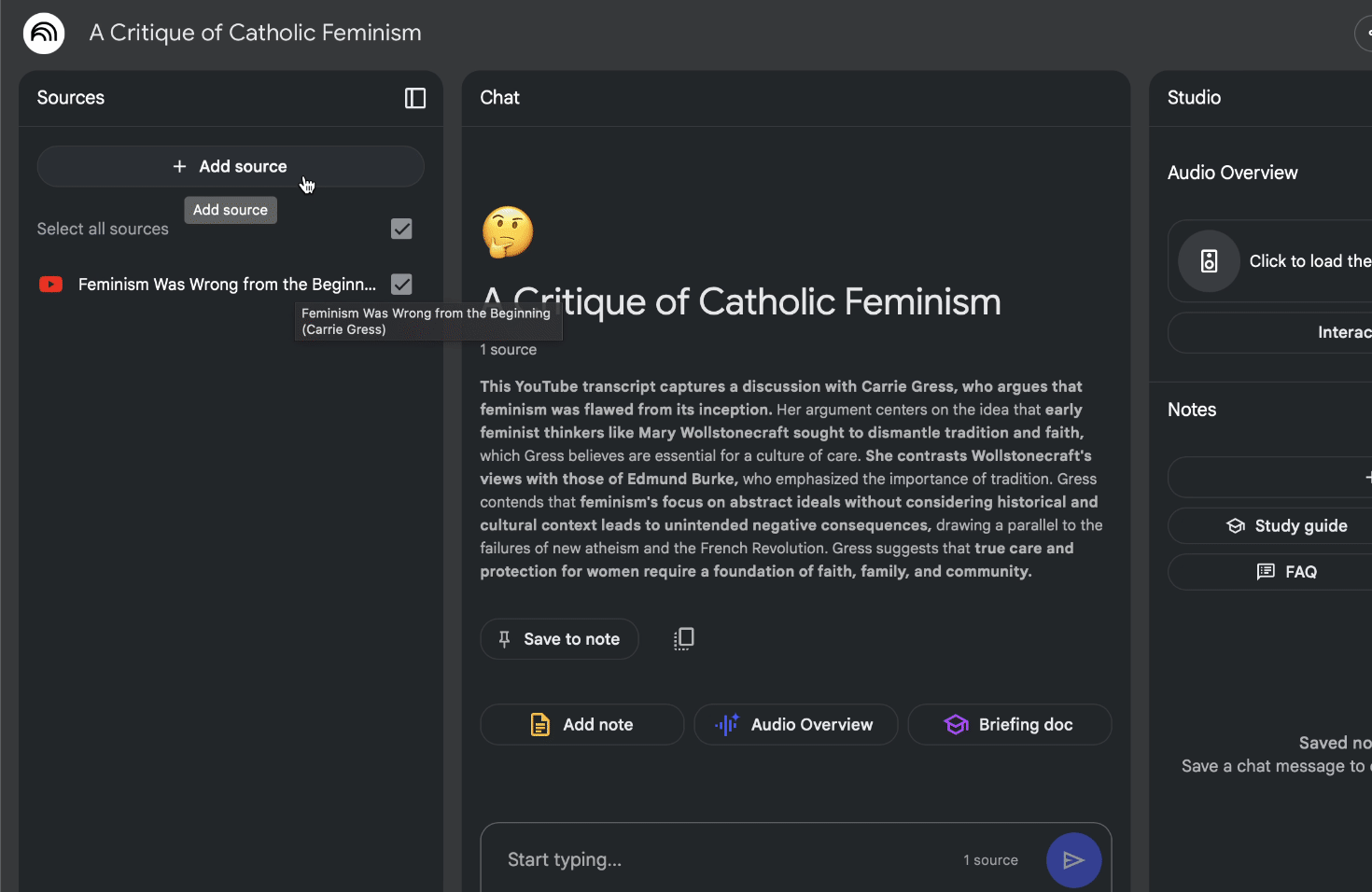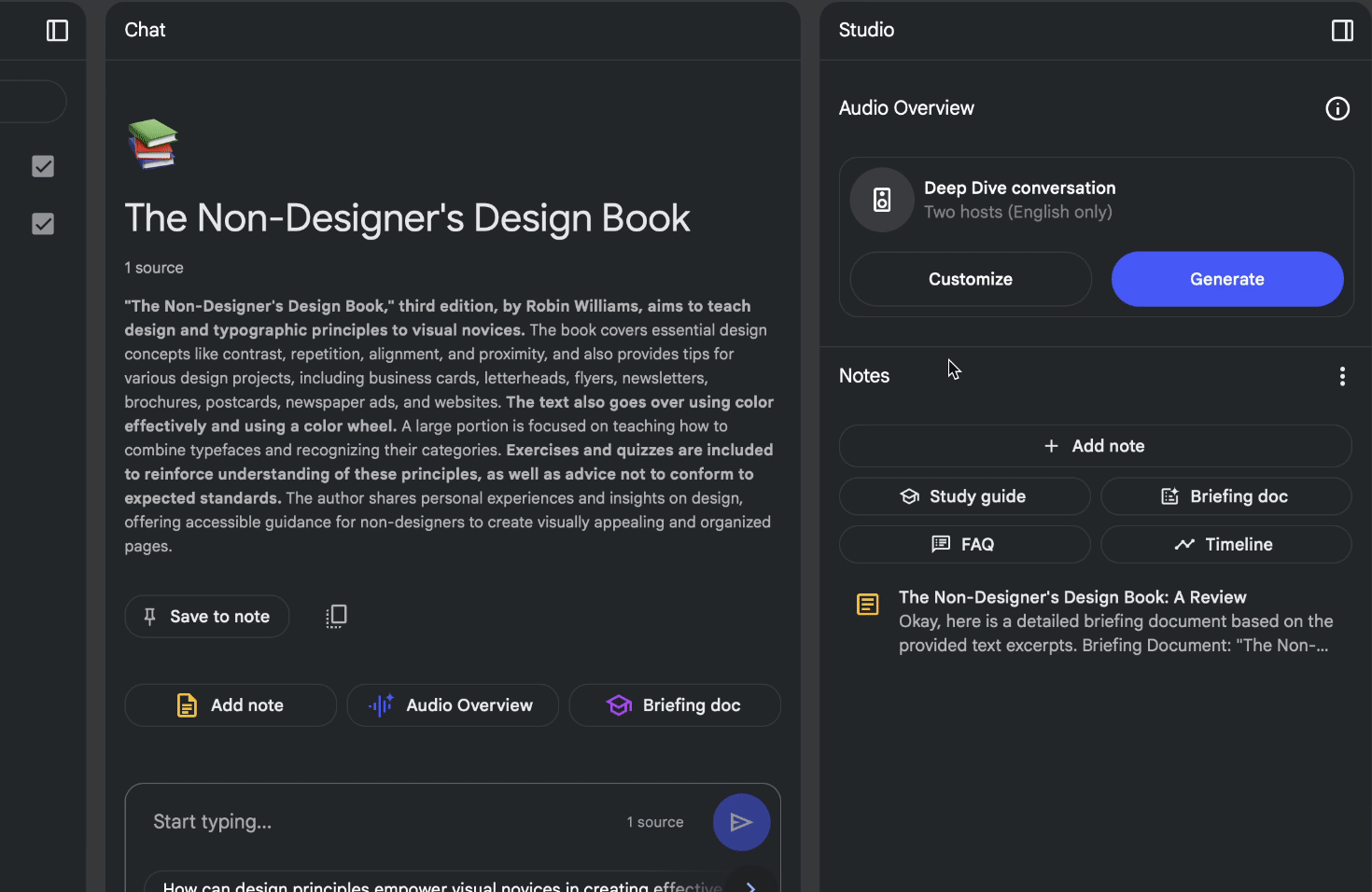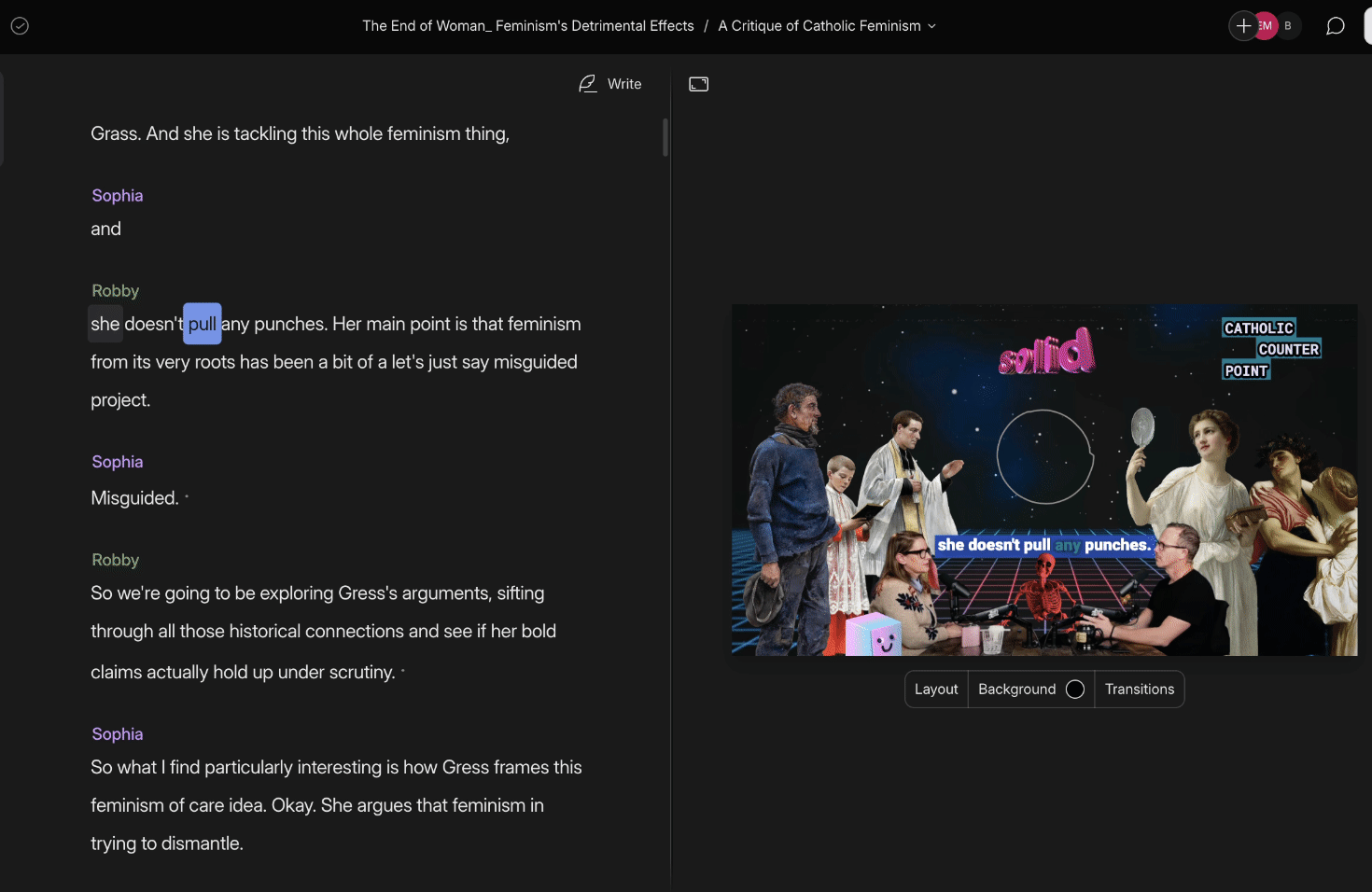Using AI to Create Podcasts and Research with Notebooklm
👉 In this post, we're going to talk about using NotebookLM to engage with various source materials to learn quicker, organize research, create new insights, and even generate custom AI podcasts.
Recently, I faintly heard the distant rumblings of Catholic rage culture about a controversial podcast with Matt Fradd and Dr. Carrie Gress.
(You might remember her from the "Theology of the Home" book series, which I highly recommend.)
I realized it would be fun to quickly create an AI podcast offering a critique and counterpoints.
This is a great case study to highlight several AI tools and concepts you should be familiar with. You can do this for your own learning or content creation.
Notebooklm: A Bigger Desk for Source Material
First, let's talk about NotebookLM, a tool owned by Google.
It's important to remember that YouTube is also owned by Google. If you've known a nefarious internet criminal who particpated in evil activities like downloading YouTube videos (or using Napster), you'll know Google and YouTube have tightened restrictions on these activities.
However, since Google owns youtube, we can do this easily in NotebookLM.
The first step is to create a new notebook in NotebookLM.
Think of notebooks as collections of sources you want to engage with, like walking up to an empty desk in a library to read and write:
What sources are you going to bring to your desk?
When you open a new notebook, you'll find a main chat window where you can ask questions and engage with your sources. Usually, I start by asking for a summary and outline of each source. If you find a useful answer, save it as a note for later reference. You can also turn these notes into sources.
Next, we're going to add a source. There are many types of sources you can add.
(In another post, I'll discuss using Elicit to find academic papers and upload multiple sources to generate insights and white papers.)
But first, let’s talk about context windows.
Context Windows = Your Grocery List
NotebookLM's strength lies in its context window, which is crucial for understanding its advantages over tools like ChatGPT or Claude.
To understand context windows, imagine a trip to the grocery store. As you're leaving, someone tells you to remember to pick up toothpaste and apples.
As you walk up and down the aisles in the grocery store, you’re analyzing the visual information. But you’re also keeping the grocery list in your active memory. When you see an item from your list, it triggers you to notice and yell:
“Ah HA! I FOUND THE APPLES I AM NOT A FAILURE!!!!”
If you're like me, you might have a small context window and struggle to remember anything while you’re in the store.
In contrast, someone with a larger context window can keep and recall more items in their mind while browsing.
🤖 ChatGPT generally has a smaller context window, but is better at generating content and reasoning.
🦾 NotebookLM excels at keeping the context window in mind, making it ideal for summarizing and recalling information from multiple sources.
NotebookLM Podcasts
NotebookLM also has a feature to create podcasts, which is surprisingly good. It's a two AI host podcast, usually between ten and twenty-five minutes long, with a conversational tone.
You might wonder why in the world you'd need to create a podcast from a bunch of sources.
One reason is for fun, but it's also a way to engage with and think about the information you're using for your work in a different way.
A good use case for the podcast is someone who needs to research and absorb large amounts of information.
Which should highlight something I’ve been saying for a long time now:
🔥 In the modern world information is becoming less valuable. Meanwhile the ability to combine information in interesting ways to generate insights and frameworks is becoming more valuable.
This is actually a great thing if you’re a knowledge worker. If you’re a content creator or Catholic parish minister, you share a lot in common with knowledge workers. (We’ll have to talk about that another day.)
So let’s walk through how we took this podcast episode and generated a sassy little AI podcast.
Step 1: Copy the Youtube URL (share link)
NotebookLM allows you to add a YouTube link as a source, so you can add multiple YouTube videos and generate a podcast to see how it combines the information. In this case I grabbed the share link and added it as a single source.
Step 2: Go to Notebooklm. Create new notebook. Add a source. (Youtube link)
Step 3: Customize the podcast prompt.
If you don't customize the podcast, it generates a standard summary of the content. I recommend experimenting with different combinations of sources to generate a podcast. It's a great way to activate different parts of the brain. For example, I've uploaded academic papers, created a podcast, and listened to it while walking to get a broad overview of the information.
In this case, I wanted to customize the prompt to get a counter perspective on the podcast's arguments. I set the prompt to generate a podcast that is critical and offers counterpoints, highlighting cognitive biases or logical fallacies, in the tone of the Colbert Report.
Step 4: Click “Generate.”
The result? A Delectable Feast. Take a listen to this sick burn.
The result was a remarkable fifteen-minute podcast with good counterpoints and critiques, categorizing arguments into historical, philosophical, and neuroscience areas, with a cooking analogy.
(Steps 5 and 6 optional for content creation.)
These last steps are optional because NotebookLM isn't primarily for generating shareable content, but you can download the audio file and use tools like Descript to edit it. I've shared some of my creations with friends, and we laughed until we cried at how quickly the world is spiraling into a technological hell-scape.
Step 5: Download the audio file.
Step 6: Upload to Descript to transcribe and add visuals.
I hope this was helpful and you use this power for good and not evil.
If you're interested, I'm hosting a free live training on using AI in Catholic Parish Ministry.
If you're not in Catholic parish ministry, I'll be offering a live training for Catholic content creators and entrepreneurs soon as well. Feel free to share the AI workshop with friends in Parish Ministry.
And more importantly….
Should I publish the 15 min Carrie Gress AI podcast on youtube???
Want to learn how to use AI in Catholic parish ministry?
I'm putting together a live training workshop where we'll cover all the things I wish I had known before starting. Things that would have got me up and running a lot quicker.
In this workshop you’ll learn how to:
free up hours of time in your ministry.
create better ministry content quicker.
learn anything faster and more efficiently.
supercharge your work with AI.
You'll also learn the prompts, workflows, and tools I've been using to do things like:
create Zelly, a custom GPT chatbot for Zealous Parish Ministers community members
make easy social content
analyze and breakdown books
create a personal knowledge base
research relevant academic papers and studies
an AI tool I use for what I now call my "Morning Writing Walk"
use AI to get insights from your ministry data
We’ll also explore:
What AI actually is (and what it isn’t) and if we're all losing our jobs
What we can learn from how society and the Church responded to past technological innovations
The ethical concerns and Church perspectives on AI
How AI can help in parish ministry with research, idea generation, content creation, ministry planning, and more.
Real-world case studies of AI in parish ministry.
How to help parishioners navigate AI and this changing time.
Practical tools, pdf downloads, and workflows you can start using today.
You’ll get access to downloadable resources to help you integrate AI into your ministry without losing the human touch.
Click below to sign up for one of the upcoming dates for this live workshop. And bring your questions!
Important Note: I'll be offering this workshop several times, so click the link to see the current available dates and spots available.
Let’s explore how AI can support your ministry, not replace it.










